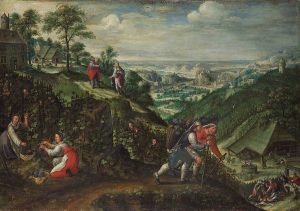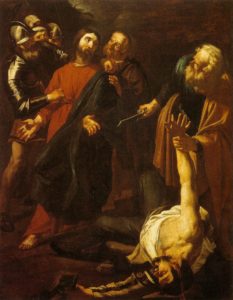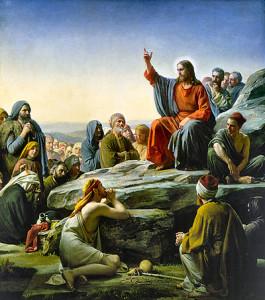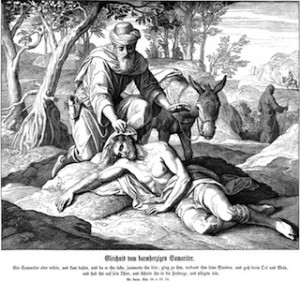Illuminations on the Lectionary readings for Aug. 14, 2022 (Pentecost 10C)
First Reading (Track One): Isaiah 5:1-7
Sunday’s gospel shows us a disturbing view of Jesus. In stern, angry-sounding phrases, he envisions the coming of the Kingdom as a destructive fire; a movement that does not bring peace but a division that will even separate family members from one another.

Workers in a vineyard (1580-1590), oil painting on canvas by Marten van Valckenborch (1535-1612). Kunsthistorisches Museum, Vienna. (Click image to enlarge.)
Sunday’s other lectionary readings help us frame this confusing passage. In the Track One first reading, Isaiah sings a love song to God’s beautiful vineyard; but this lovely image literally turns sour. Although it was thoughtfully planted and carefully tended, the vineyard produced bitter, unusable grapes. God is outdone with it and will tend it no more. Then Isaiah names names: The vineyard is the house of Israel, the people of Judah. God planted them to reap righteousness and justice, but they’ve failed in this mission, and their harvest will be destruction and exile.
First Reading (Track Two): Jeremiah 23:23-29
Do you think of God as being “transcendent,” or “wholly other,” distinct from the world? Or is God “immanent,” right here around us and present in our lives? The Prophet Jeremiah, who spoke words of doom and warning before the destruction of the first Jerusalem temple, finds God in both places. Don’t think that God is only far off, Jeremiah warns: God is nearby, too. In words that Christians might see as foreshadowing Jesus’s words in today’s gospel, God has fire and destructive power ready for those who forget God’s word.
Psalm: (Track One): Psalm 80:1-2, 8-18
Isaiah’s vineyard metaphor finds an echo in the Psalmist’s song: Israel, the beloved vine that God brought out of Egypt, tended and nurtured, once grew so mighty that it filled all the land. But now everything has changed. The vine is ravaged, eaten by animals, burned like rubbish. Calling for God’s protection, the Psalmist asks God to tend the vine again, restoring the people and showing us the light of God’s countenance.
Psalm: (Track Two): Psalm 82
The idea of God sitting in a divine council of other gods sounds strange to modern ears accustomed to the idea of monotheism that’s fundamental in Scripture. Bible historians say this council may be an echo of ancient Near Eastern tradition, when early Israelites understood our God as supreme over the lesser gods of enemy nations. But the core of the Psalm is as relevant now as it was in the Psalmist’s time: God insists on justice, and calls us to stand up for the humble and the needy, the weak, the orphan, and the poor.
Second Reading: Hebrews 11:29-12:2
Building on last Sunday’s reading from the Letter to the Hebrews, in which the author praised Abraham and his descendants our ancestors in faith, this week’s passage adds a quick series of Hebrew Bible images. We hear praise for the biblical heroes who achieved greatness through their faith, and who now form a cloud of witnesses that surrounds us. These witnesses, we hear, show us the way to “run with perseverance the race that is set before us” as we follow Jesus, who endured the shame of crucifixion and now sits at the right hand of God.
Gospel: Luke 12:49-56
During this season after Pentecost we have been following the Evangelist Luke’s account of Jesus having set his face toward Jerusalem, where he will confront the temple and civil authorities in conflicts that will take him to the cross. Repeatedly in lectures and parables he have heard him warn the apostles that it will not be easy to follow in his way. Perhaps we shouldn’t be so surprised, after all, to hear the “Prince of Peace” warn that he came not to bring peace but fire and division (or, in Matthew’s version of this passage, a sword). Bursting with passion for his journey, perhaps Jesus wants his followers to understand that walking this hard journey with him may divide us even from friends and family.



